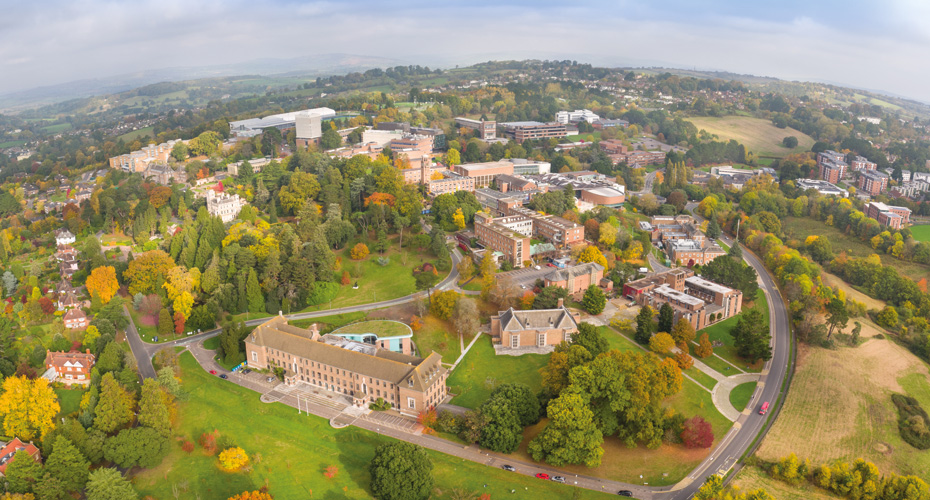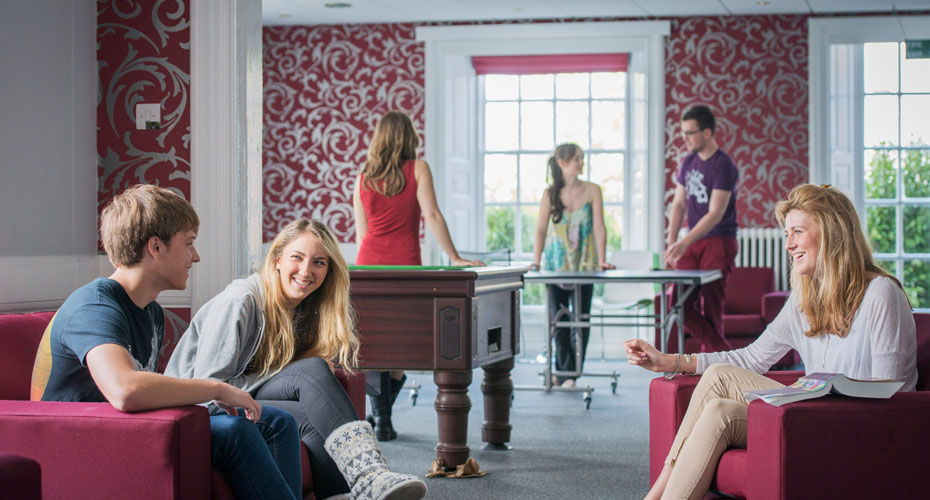
I really enjoyed the location, of Devon and the South-West in general. I had intended to come to a visit day delayed by snow and so when I came in spring it was gorgeous to behold. Streatham was the choice as St Lukes is the medical campus so the Devon Campus and so liking Devon and Exeter in general meant that Streatham was the choice for me. It wasn’t too far from home, but neither did it feel like I was too close either as I wanted the freedom to be able to get home if I really really needed but not be in a position where I would just go home on the weekends and not truly “live” as much at university like some of my friends who went to universities with locations much closer to home for that reason. Streatham was well located and I wanted a campus for my university experience compared to a city experience. I also chose Streatham for the variety of accommodation options, when I had to list my preferences I felt that I wouldn’t have minded being put in any of them even as I obviously had a favourite and this helped make it really appealing to make a choice like that over Penryn or other universities for me personally. I also chose Streatham because while not out of the way, it wasn’t a campus in the middle of Exeter and therefore I felt that I’d not only be slightly safer though this wasn’t the primary concern but that it would generally be quieter for me at night and that when I did want or need to go into Exeter that the trade-off wasn’t so great in terms of being close enough to be a short walk but far enough to not have constant noise at night into the early hours.

Streatham is also a nice middle grounds in terms of campus size as for me I enjoy being able to go for a walk while not having to worry too much about being on the wrong side of academic buildings due to distance and having to make things on time. Being able to enjoy those walks and to take the opportunity to listen to some music and have some piece while walking back and forth from lectures and seminars during those short breaks for travelling. These reasons to me made Streatham a natural choice, as many other campuses might have some of these things but Streatham combined all of these things in addition to the academic benefits.
I think despite some groaning from some students, I found the hills of the campus distinctive in a good way. I’m not the most fit person but walking up and down hills reminds me of home and I enjoy the different sights that verticality such as Streatham has can provide as you look up and down the various hills such as Forum, Mardon and of course Cardiac. Streatham has so many green spaces which to someone like me who came from a rural area just makes it feel welcoming and feel like home in the sense of being surrounded by nature. I walk around campus a lot and it’s always nice to see animals about such as foxes, rabbits etc when I walk back from various social engagements and to see them running across a green is always in its own way a moment to remember even if only slightly. Things like that help to make Streatham distinctive both from some campuses that are a mess of greyscale and city universities in which you wouldn’t see those kinds of things that make Streatham a place to be. As part of this, there are so many different ways to walk places that are reasonably close in terms of time that mean you can walk a different way to and from lectures in better times or the library and see different things and it helps you not feel quite so monotonous while going about the day-to-day of studying. Likewise the Forum itself, the main central building, is very open and has much of what you would need for first year students and generally in terms of social engagement that helps have a good central place to meet up with people in terms of social centring of events due to the geographic centring. Together all these things made Streatham not just my choice for preference but distinctive next to other options and helped me make the choice.

I’ve always been passionate about history from a young age, watching repeats of shows such as the World at War at my grandparents when I visited them due to them not having kids channels and it being the next best thing to me. I always had a keen interest in reading, receiving a beautiful tome that was the Second World War in photographs across all the various theatres when I was in primary school, it took me a while to get through but my interest in reading and seeing and understanding more spurred me to continually try to learn more about history. While to my young mind that was mainly the accumulation of “pure” facts as history this was something I eventually learnt more about in terms of techniques over my GCSEs and A Levels that I was already doing enough reading around the side to be interested to talk about things like historiography and deeper ideas before I’d finished my GCSEs. Despite acing my History exams at GCSE, I almost didn’t take it at A Level due to personal doubts about if I’d really understood the subject truly. Those doubts are normal so I’d say they really helped me know I’d made the right choice with History when it came to picking a course in Year 13/Upper Sixth. Having doubts about my ability to be more analytical helped me realise it was the right decision when I find that such analysis came naturally to me over the course of the A Level and that meant it really helped me feel comfortable applying for History for a degree course knowing that even if it was going to be another step up and a massive one at that that I would want to rise to that challenge rather than be nervous about it all. These things together as mentioned just made the choice obvious.
History is distinctive I think because like all humanities it is both ever changing but also with a wealth of previous work to draw upon. I think in many ways history is distinctive because it says a lot about the present. This is true of all humanities when looked back on, but history can take the most advantage of this perspective to say more about the human condition as the grouping’s name implies. I think history is perhaps distinctive in addition because so much of how it is conducted and written often leads to concerns about the impact that history itself can have on history and this is a subject that personally draws my attention so much. It adds this interesting and yes distinctive element of metatextual-ness to all works of history in that history can itself shape the future to come and how works of history actually shape how we view the events that happened. The past is prologue one could say, and it is the writing of history that establishes “the truth” that becomes accepted from the entirety of the events of the past. I think history also has a lot of interesting ways in which it can intersect with other subjects including other traditional humanities subjects like with how one can include literary analysis to further historical points and how this isn’t necessarily unique in concept but I personally feel that history has the greatest scope on these fronts in terms of its ability to take other subjects concepts and apply them to history while still being fundamentally works of history rather than geography or English literature analysis. I think all these elements make history distinctive in my eyes.

I was interested in Exeter over other places due to factors mentioned before, one of the biggest factors academically was how good Exeter was at medieval history. It could still be better, but that’s mainly because there is such a dearth of medieval history available and so it wasn’t by default that Exeter was my best option but also because there are many experts on tenure and working here who specialise in medieval history and even early modern history which enabled me to not be forced to do modern history. Not that modern history isn’t interesting, but that having a meaningful choice made Exeter a natural choice. The University of Exeter also had a really interesting course with lots of choice in terms of modules from year one compared to many other universities where you must do certain topics due to staff limitations or their particular idea of history and Exeter didn’t have that limitation in my experience and from my research when choosing. This made it easy for me to pick the University of Exeter.
I got involved with the Student’s Guild Exeter Game Society all three years so fair, ending up taking a committee role in all three years by helping fill a vacancy in my first year, as president in my second and now returning to my previous role but full time in my third. That’s something to do with my interest in tabletop roleplaying games and helping people who are interesting in them and new find people to play with and generally it’s helped me develop my organisation skills in working to help with those things and my teamworking skills thanks to working on a committee in both a prime leadership role and secondary responsibilities to myself and others. I’ve also gotten involved with Residence Life Mentoring and Student Ambassador work as can be told by the fact that I’m writing for this blog as a student now. I find both very fulfilling and they’ve helped me broaden my horizons with new interests and new things I never thought I’d do before. I’ve never been the most social in normal settings but open days and talking to prospective students and their parents has really helped me learn how to open up and be more personable in other areas and helped my development on that front.

My favourite part of living in Exeter is generally the people and the places, I’m teetotal myself so I can’t speak to say the nightlife or bars but as more of a foodie I find many of the places in Exeter to be great for a variety of purposes such as eating out with family when they drop me off to say goodbye for the term and also for when they visit and also for places to go with friends both for normal meet ups and for special occasions. I’ve also personally found plenty of places to patronise some of my interests such as tabletop games and generally different welcoming communities even from places that mainly appeal to locals that are welcoming and open to all. These things help me find other likeminded people and this means that while I love home, Exeter being larger but not too large means I can find more people to engage in those hobbies with than in Herefordshire. This applies generally to other people with other interests equally and that’s why I think Exeter in general offers a nice middle ground between super large cities and small towns and villages that is appealing to me who wants something bigger but not too much and to those in larger urban areas who might want to live somewhere quieter but not too much quieter.

